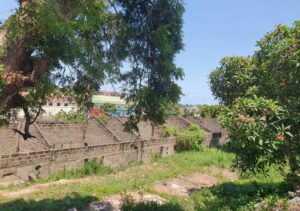By Juliet Aguiar DUGBARTEY, Takoradi
The management of Takoradi Hospital has made a passionate appeal for urgent expansion and infrastructural upgrades to enhance healthcare delivery and meet the growing needs of patients in the Sekondi-Takoradi Metropolis and beyond.
Medical Superintendent of the hospital, Dr. George Peprah, told the Business and Financial Times (B&FT) in an interview that the facility’s current capacity is overstretched and no longer adequate to serve the increasing patient load and growing demand for specialised services.

“Expanding the infrastructure will create more space, improve operational efficiency, reduce costs and enable the hospital to serve more patients while offering critical specialised services in a conducive environment,” he stated.
A legacy facility in need of modernization
Established in 1929 as the European Hospital to cater for workers constructing the Takoradi Harbour, the facility has since evolved into a key referral hospital in the Western Region.
Originally designed with only male and female wards, the hospital has gradually added other essential units such as maternity, paediatrics, emergency care, and a Neonatal Intensive Care Unit (NICU).

Additional services, including cardiac diagnostics like echocardiograms, ECGs, ambulatory blood pressure monitoring and dialysis, have all been accommodated within the limited existing space.
“We now operate with 100 beds, which are currently fully utilised. Every new service introduced has had to be fitted into repurposed rooms. Our dialysis centre, for instance, is housed in what was once a drug storage room,” Dr. Peprah disclosed.
With the support of the Sekondi-Takoradi Progressive Club Global, the hospital acquired two dialysis machines. However, demand far exceeds supply. “Each machine is handling about four cases per day, which is woefully inadequate,” he noted.
Infrastructure, ICU and emergency concerns
The hospital’s emergency unit recently benefitted from renovation support from the Church of Jesus Christ of Latter-day Saints after years of neglect that saw patients exposed to rainwater during storms.

Dr. Peprah lamented the stalled expansion project initiated in 2008, explaining that if completed, it would create space for vital services, including a much-needed Intensive Care Unit (ICU).
The region currently lacks an ICU, forcing referrals to Cape Coast or Accra—often with tragic consequences.
He cited a recent case involving a young woman in her twenties with severe chest complications and fluid in her lungs. Despite emergency intervention, the patient died due to the lack of an ICU bed and delayed referrals.
“These cases are not isolated. If we had an ICU, many of these lives could be saved,” he stated.

Centennial approaching
As the hospital approaches its centenary in 2029, Dr. Peprah expressed concern over the deteriorating infrastructure, including asbestos roofing which leaks during rains. “The administrator has made efforts to patch it, but the onset of the rainy season makes this a major concern,” he added.
He called on the government, corporate institutions, philanthropists and well-meaning individuals to support the hospital’s expansion and refurbishment efforts to ensure continued quality healthcare delivery.










